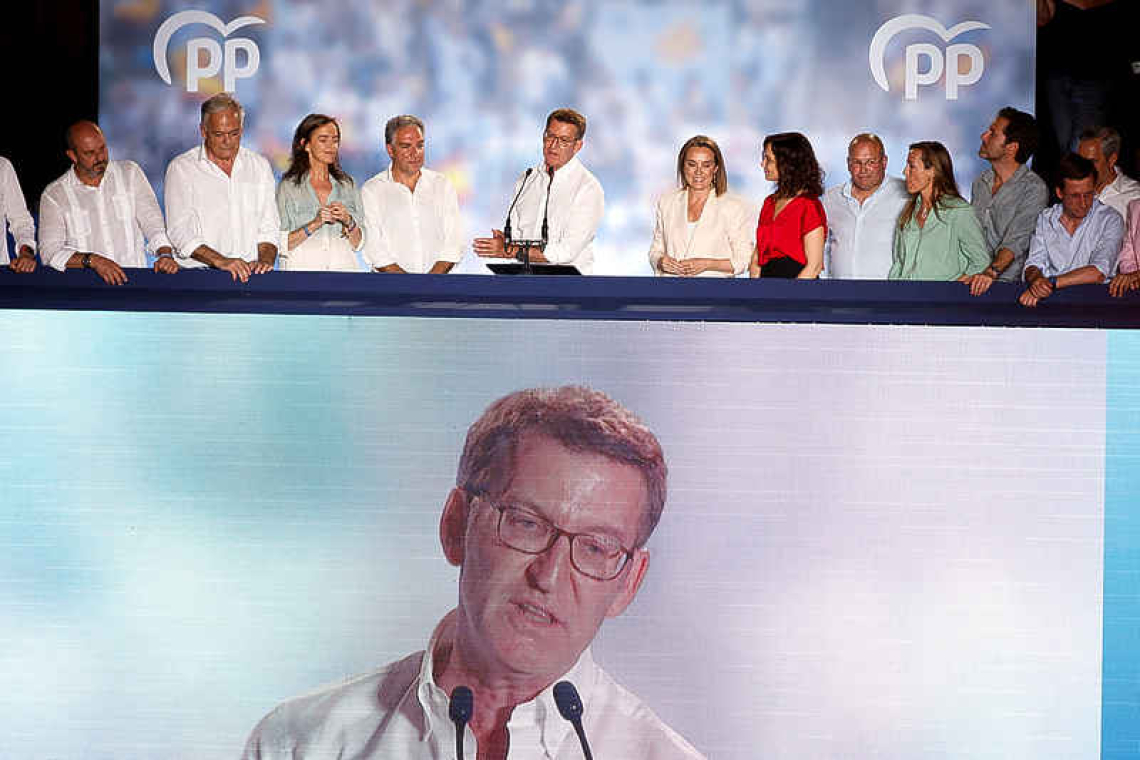Spain's opposition People's Party leader Alberto Nunez Feijoo speaks during the general election, in Madrid, Spain, on Sunday.
MADRID--Spain was heading for a hung parliament, with neither left nor right likely to secure a majority in the Sunday election, paving the way for drawn-out and potentially fruitless negotiations to form a government.
With 99% of votes counted by 11:45 p.m., the opposition People's Party (PP) had 136 seats while Prime Minister Pedro Sanchez's ruling Socialists (PSOE) had 122 seats. Parties with the greatest potential to be kingmakers were nearly even with far-right Vox on 33 and far-left Sumar on 31 seats. Negotiations by the two blocs to form governments will start after a new parliament convenes on Aug. 17. King Felipe VI will invite leader Alberto Nunez Feijoo of the PP, the top vote winner, to try to secure the prime ministership. In a similar situation in 2015, PP leader Mariano Rajoy declined the king's invitation, saying he could not muster the support. If Feijoo declines, the king may turn to Sanchez with the same request. The law does not set a deadline for the process but if no candidate secures a majority within two months of the first vote on the prime minister, new elections must be held. A deadlock or protracted negotiations could distract from Spain's current presidency of the European Union Council and upset financial markets. "The Spanish market, like all equity markets, hates ambiguity," Steve Smith, Invesco European equities fund manager, told Reuters ahead of the vote. Prime Minister Pedro Sanchez called a surprise snap election after the left took a drubbing in local elections in May. The vote coincided with what would be many Spaniards' summer holidays and one of the hottest months in the sunbaked nation. Voters showed up in swimsuits and used ballots as fans while polling stations brought in air conditioners or moved voting tables outside.
Turnout was up, at 71.31% compared to 66.23% in the last election in 2019. Polls in the weeks leading up to voting - and even those released as the final ballot box was sealed at 9 p.m. - predicted a working majority for Feijoo's PP and Vox. Ignacio Jurado, political science professor at Madrid's Carlos III University, blamed the PP's negative campaign against Sanchez for a drop in support and said Sanchez' abrupt move in calling snap elections might still pay off. "The PP needed something more, especially because Vox is a hindrance," he said. As the results rolled in, a mood of jubilation outside the People's Party headquarters in central Madrid's Calle Genova turned anxious as the gap between the PP and PSOE remained stubbornly slim. Galo Contreras, PP mayor of the nearby town of Burgos, said he was not surprised the race was so close given missteps by the PP in the last week. Each seat gained for the PP was loudly celebrated by the crowd of supporters. But one admitted as the night went on: "This isn't looking good." Meanwhile, two miles (2.6 kilometers) across town at the Socialists' headquarters, some senior officials were smiling. A supporter in the corridor said gleefully: "We were dead but we're now alive." Feijoo could try to persuade smaller parties to back a PP-Vox coalition.
But many appear reluctant to support the ascent of a far-right party into power for the first time since the four-decade rule of dictator Francisco Franco, who died in 1975. The Basque Nationalist Party (PNV) said before the election that it had no agreement with PP and Vox while Teruel Existe told El Pais it would not support such a coalition. Sanchez has more options for negotiations but may still struggle to cobble together a majority, with potential allies looking for concessions in return for their support. In the present scenario, Sanchez' PSOE would rely heavily on Catalan separatist parties Junts and ERC or Basque separatists EH Bildu. Junts' Catalan candidate recently said the party would seek a new vote on Catalan independence in return for coalition support, while Junts' former Catalan President Carles Puigdemont has said he would support neither Sanchez nor Feijoo. Hung parliaments have become the norm in recent years due to the fragmentation of Spain's politics and the emergence of new parties challenging the dominance of the PP and the PSOE.
The country held two elections within six months in late 2015 and 2016, after which there was a 10-month standoff until the Socialists finally agreed to abstain from a confidence vote to allow the PP to form a minority government. In 2019, two more elections were held before the PSOE and far-left Podemos agreed to form Spain's first coalition government. Jose Ignacio Torreblanca, director of the Madrid office of the European Council on Foreign Relations, said Spain was now faced with "a catastrophic tie".







